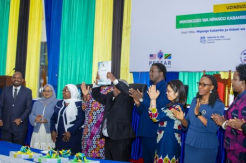On September 23, 2022, Tanzania launched the Comprehensive Council Social Welfare Operational Planning Guideline (CCSWOPG), which provides guidance and framework for integrated efforts from the Tanzanian Government, development partners, and other social welfare stakeholders. The guideline stresses participatory and effective use of social welfare data generated in the council to develop an evidence-based comprehensive council social welfare plan. "With this guideline, we are going to have sufficient data to ensure a comprehensive break down of social welfare needs, resources, and services for each group, be it the most vulnerable children, elderly, and others," said Dr. Dorothy Gwajima (MP), the Minister for Community Development, Gender, Women, and Special Groups (MoCDGWSGs) during the launch event.
Before CCSWOPG, social welfare interventions at the village, ward, and council levels were planned, budgeted, and reported following the Comprehensive Council Health Plan (CCHP). Although social welfare services were the priorities of the CCHP, the planning and budgeting process focused more on curative and preventive health services, with very little attention to social welfare interventions at all levels. This led to inefficiency and ineffectiveness in providing social welfare services at the regional, council, and community levels. Therefore, the need to have a more harmonized, focused, and standardized planning, budgeting implementation, and reporting process for social welfare interventions at the local government level.
To address the historical and practical challenges relating to planning, budgeting, and reporting of the social welfare services in the country, the Government of Tanzania requested support from the United States Agency for International Development (USAID). Through the USAID-funded Community Health and Social Welfare Systems Strengthening Program (CHSSP) activity implemented by John Snow Inc., the processes for developing the CCSWOPG were initiated. Upon phasing out of the CHSSP program in 2020, the USAID funded Adolescents and Children HIV Incidence Reduction, Empowerment and Virus Elimination (ACHIEVE) project took over the activity through its completion.
ACHIEVE worked closely with the President's Office - Regional Administration and Local Government (PO-RALG) and MoCDGWSGs to finalize and operationalize the guideline. Part of the support included coordinating a series of CCSWOPG workshops, trainings, and dissemination and orientation sessions that have included 24 regions, 50 councils, 2 higher learning institutions, and 11 government social welfare institutions.
On August 31, 2021, the PO-RALG and MoCDGWSGs signed the CCSWOPG. On December 8, 2021, PO-RALG issued a circular to Regional Administrations informing them about the guideline, its operationalization, and the introduction of the CCSWOP window into the digitized Government's Planning and Reporting System (PlanRep). All required supporting systems (assessment, periodic reporting, and score ranking windows) have also been incorporated. "A robust social welfare system is the best gift we can give to the current generation and those yet to come," said Kate Somvongsiri, USAID Tanzania Mission Director, during the launch event. "The CCSWOPG brings efficient, far reaching, extensive, and well-coordinated social welfare services that befit the needs of the most vulnerable populations. Further more, it will provide unified ways of addressing public health challenges like HIV/AIDS."
ACHIEVE worked with the Government through PO-RALG and MoCDGWGs to collect CCSWOP baseline data on the contribution of CCSWOP to increased resource allocation for social welfare activities across 50 councils where ACHIEVE conducted dissemination and orientation training. The methods used included desk review and impact analysis. Overall results show that among the ACHIEVE's 50 trained councils, CCSWOP has contributed to increasing the allocation of resources for social welfare interventions by 81.87% in 2022/23 compared to 48.36% in 2021/2022. Ilala City Council is among the 50 councils trained by ACHIEVE. The council reports that in the 2021/22 budget, social welfare activities were allocated only TZS 106,120,000 ($46,139,130) out of the overall council budget of TZS 213,580,650,440 ($92,861,152). This is equivalent to 67.88% of the requested budget. In 2022/23, social welfare activities have been allocated TZS 1,385,344,402 ($602,323) out of the overall council budget of TZS 209,720,411,484 ($91,182,787). This is equivalent to 100% of the requested budget.
ACHIEVE will continue to work with the Government of Tanzania through its sectoral ministries to operationalize the guideline fully. The sectoral ministries responsible for implementing the CCSWOPG include the PO-RALG, MoCDGWSGs, Ministry of Finance and Planning, Ministry of Home Affairs, Ministry of Constitutional and Legal Affairs, Ministry of Health, and Ministry of Education, Science, and Technology. ACHIEVE is a five-year (2019-2024) USAID-funded global project whose primary goal is to reach and sustain HIV epidemic control among pregnant and breastfeeding women, adolescents, infants, and children. To reach this goal, ACHIEVE supports OVC and DREAMS service delivery, provides technical assistance to strengthen social welfare systems and improve service quality and reach, and supports capacity development for local partners to sustain services at the community level. ACHIEVE is implemented by Pact in partnership with Jhpiego, Palladium, No Means No Worldwide, and WI-HER.

Photo Credit: Pact/Aidan Tarimo
